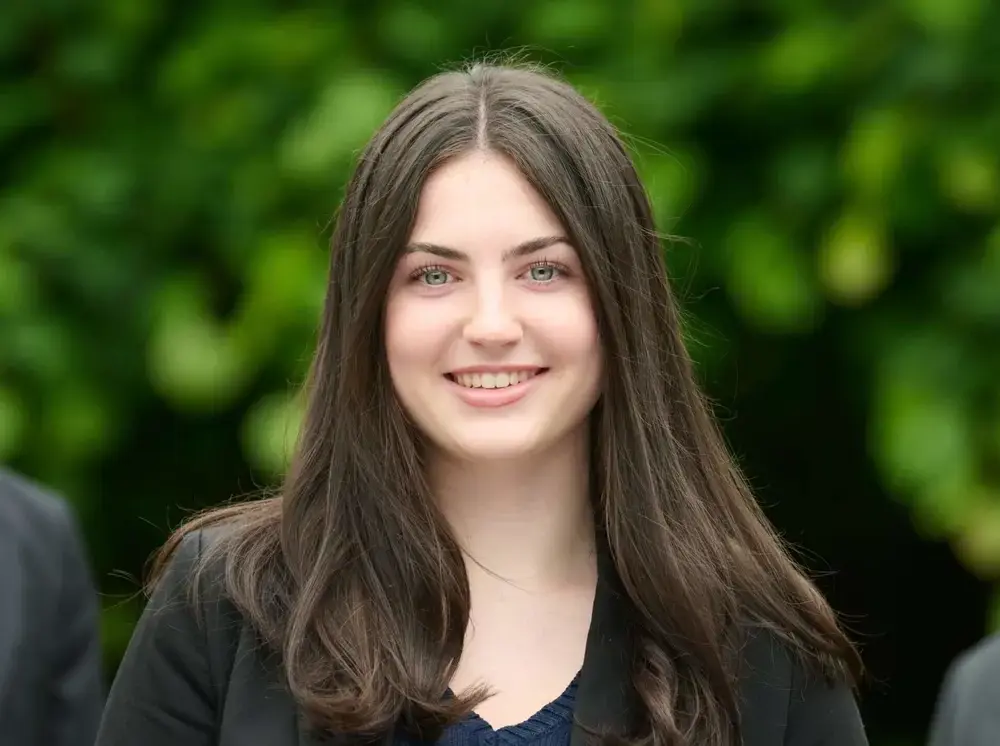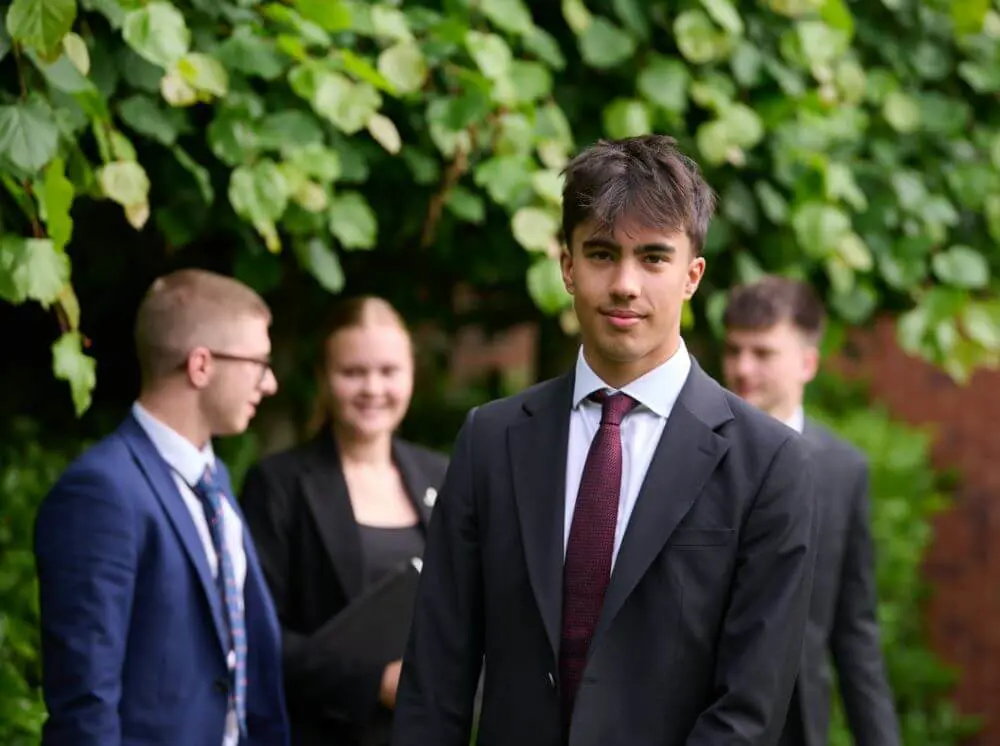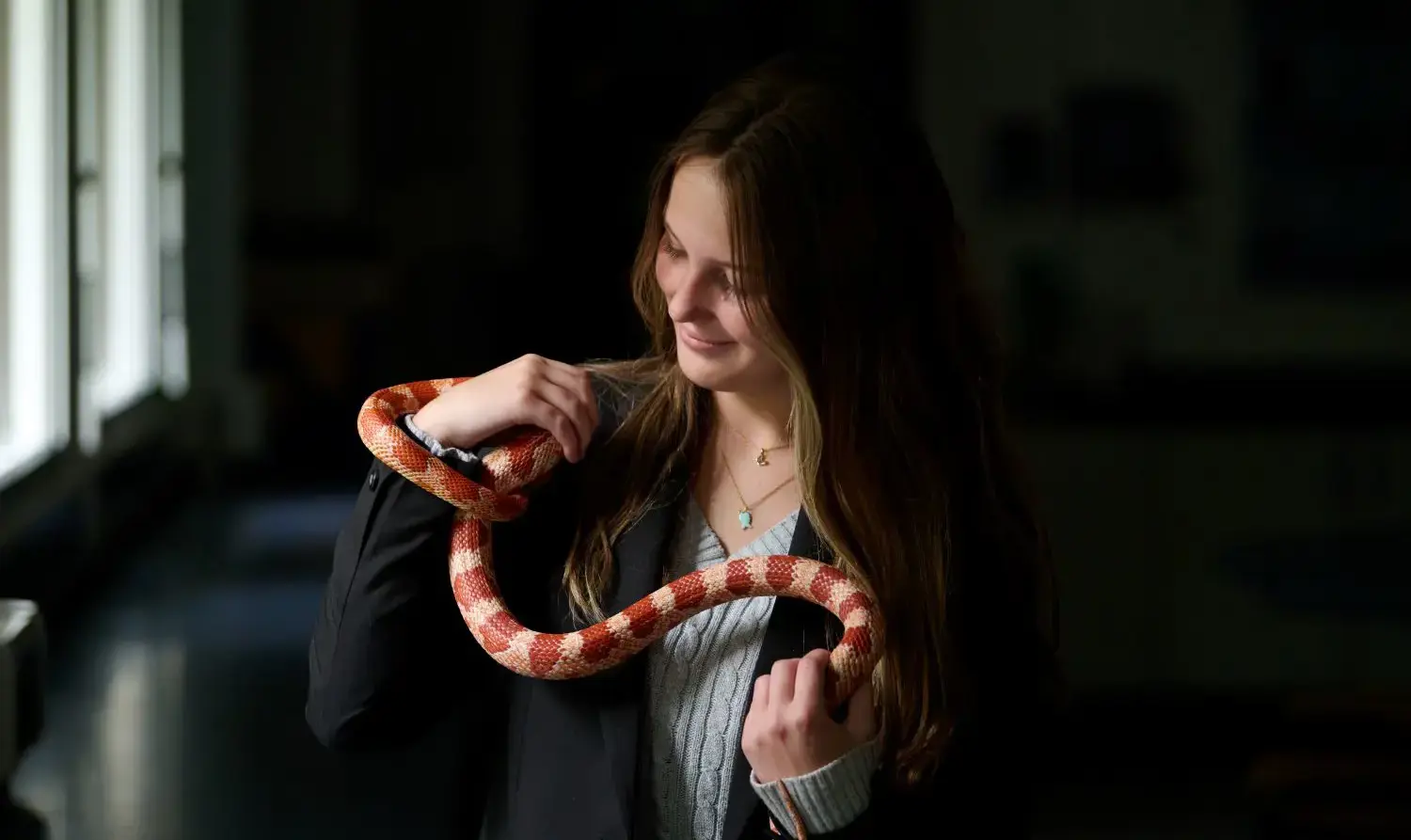Academic
It is The Grange School’s commitment to an all-round education that marks us out as a school.
IT IS IMPORTANT, HOWEVER, TO recognise the consistently excellent A Level results that have established The Grange as one of the best performing schools in the North West of England.
We are particularly proud that our students regularly achieve significantly higher A Level grades than would be forecast based on previous results, known as added value. Our Sixth Form students achieve these excellent results thanks to personal ambition combined with the unrivalled support and guidance offered at The Grange School.
82% of all A Level entries were A* - B grade in 2024 |
Small Class Sizes & a Carefully Designed Timetable
Small groups allow teachers to work closely with individual students. At times, students will need extra guidance and support. At other times, students will benefit from being introduced to material that takes them beyond the A Level specification. The personalised support offered from subject experts at The Grange School allows each individual to reach their potential.
Average class size of 7 students |
In addition, Sixth Form students at The Grange School benefit from a timetable that offers far more time in the classroom than is possible in most schools. Over our two-week timetable, students will spend 10 hours with their teachers in each A Level subject. This regular contact with well qualified subject specialists, along with a structured programme of independent study, contributes significantly to the academic success of our Sixth Form students.
Subjects
A WIDE RANGE OF SUBJECTS delivered by expert teachers in small classes (averaging seven students), and wide range of subjects paves the way for success at university, in your career, and beyond.
|
With personalised support, tailored study pathways, and a vibrant, collaborative campus-like environment, you'll thrive in an exciting space designed to help you achieve your goals: whether your A Levels are a pathway to university, an opportunity to explore your passions in greater depth, or preparation for your first job, The Grange School Sixth Form ensures you're ready for life beyond the classroom. Students usually take three A Levels, but there’s also the option to study four. If you choose three, you’ll be encouraged to explore an additional course over one or two years. This could be our Extended Project Qualification or even a new GCSE. |
|
| Art & Textiles |
|---|
Course Content:Both A level Art and Textiles concentrate on the development of research skills that work alongside the continual acquirement of practical skills that aid visual communication. Students are required to design and develop their own personal programme for learning, with staff ensuring that they meet the required assessment objectives. Assessment:Examination board - EDUQAS The A level is split into 60% coursework that is internally set and moderated with an external set assignment worth 40% that is also externally moderated. All work is then externally moderated at the end of the course. Complementary Subjects:Students who are considering a career in the visual arts or design would benefit from studying a second visual subject such as Graphics. This gives students the best possible opportunity to produce portfolio of the highest standard required for the vast majority of degree course applications. Extension Opportunities:Where possible students have the opportunity to exhibit outside of school. We have previously worked with the Ellesmere Port Boat Museum, exhibited at the annual Chester Arts Fair, the Storyhouse Theatre and at The Simply Cheshire event at Arley Hall. Live briefs for part of the L6 Textiles programme, giving students real life experience of customer needs, marketing and delivery of products. Recent Success:The department has excellent examination results each year, with students regularly winning the student prize at the Chester Arts Fair. The department also has a fantastic track record in placing students the very best creative university courses. What Next?Students go on to achieve great success studying Art, Fashion, Textiles and Architecture at some of the best establishments in the world, let alone the UK. |
| Biology |
Course Content:Key topics on A Level specifications:
Skills:
Complementary Subjects:Students wishing to take the subject further than A Level are advised to consider Chemistry as It is recognised that there will also be students for whom Biology will be the only science studied. These pupils should find the course to be a fulfilling and worthwhile challenge in its own right. What Next?For those wishing to study a biological science at university, the choice of subject is huge; Biochemistry, Biology, Biotechnology, Cell Biology, Ecology, Environmental Sciences, Genetics, Human Biology, Immunology, Marine Biology, Medicine, Microbiology, Molecular Biology, Nutrition, Pharmacology, Physiology, Psychology, Plant Science, Sports Science and Zoology are some of the most popular options. Successful study will open up a whole world of careers; Animal Scientist, Conservationist, Dentist, Dietician, Diver, Ecologist, Forensic Scientist, Marine Biologist, Medic, Patent Lawyer, Pharmacologist, Psychologist, Psychiatrist, Science Journalist, Research Scientist, Veterinary Scientist or even Teacher! Extension Opportunities:All Lower Sixth students will be invited to enter the British Intermediate Biology Olympiad and Upper Sixth students compete in the British Biology Olympiad. There is a Biological Expedition every other year. Recent expeditions have visited Borneo, Galapagos and the Amazon, South Africa, Mexico, Egypt and Honduras. Sixth Form students are encouraged to help with the organisation and running of Biology Club and our David Attenborough video club, ‘Dave’. Other competitions that Sixth Form students have entered in recent years include the Nancy Rothwell Prize for anatomical drawing, The Price Philip Award and Marsh Prize for zoological research. All Lower Sixth biologists are encouraged to attend the annual field trip to the English Lake District in June. Studies include sand dune succession, oxygenation in a mountain stream, zonation on a rocky shore and heathland management. |
| Business |
Course Information:The study of Business at A level involves looking at the key functional areas of a business. These areas include finance, human resources, marketing, operations as well as assessing the impact of the external environment on a business. For example, how will Brexit affect a business and will all businesses face the same issues? Business at A level is about assessing a business’ current situation, where it wants to go and analysing and evaluating the strategies it could follow in order to achieve its aims and objectives. Course Content:We follow the AQA Business specification. The core topic areas are:
Skills:Students should have an enquiring and analytical mind. They should be able to write fluently and have a good level of numeracy ability. Students should also have a keen interest in what is happening and why in the world of business. Through the study of business a student will develop analytical and evaluative skills. They will be able to take the business tool-kit of ideas and theories and apply these to a variety of situations. Complementary subject:
What Next?Many of our students have gone on to study Business Management at degree level or have studied areas of business such as marketing, accounting or operations management related degrees. A qualification in a business related subject signals to employers that the student has both analytical and evaluative skills and is able to provide a balanced approach to problem solving. |
| Chemistry |
Course Information:Exam Board: OCR Chemistry A Key topics on A Level specificationOrganic Chemistry: Moles, Alkanes, Alkenes, Haloalkanes, Amines, Arenes, Carbonyls, Carboxylic Acids, Esters, Analysis. Physical Chemistry: Atomic Structure, Bonding, Redox, Kinetics, Equilibrium, Thermodynamics, Acids and Buffers, Electropotentials, Transition Metals. Skills:The course aims to:
Assessment:Three examinations at the end of Year 13:
All papers contain questions related to practical chemistry. Papers 1 and 2 contain some multiple choice questions. In addition, students can receive Practical Endorsement. This is awarded if the student completes compulsory practical tasks over the two years of study and demonstrates the necessary skills. Complementary subjects:Maths and other Sciences, Languages - degree course which have a year abroad will link the two, Geography. What do students go on to study at University?
Extension Opportunities:
|
| Computer Science |
Course Content:We are living in the midst of a revolution powered by computers. This revolution has brought changes to all aspects of society. AQA have worked closely with universities and industry to develop this new A level specification. Computer Science can provide a student with the necessary education to innovate in extraordinary ways. Computer technology is at the heart of many endeavours to make a meaningful difference in the world, whether through scientific research, medical advances, helping disabled people lead more fulfilling lives, improved communication and transportation or many other areas. These advances generally happen not by applying existing technology to a new problem, but by collaborating with experts in other fields and developing innovative solutions. Computational thinking can bring careful, logical approaches to problem solving and an understanding of the power of abstraction to many fields of human endeavour. The ability to think logically and to develop solutions is applicable even if one does not ultimately write those solutions in a programming language. Skills:The AQA A Level specification in Computer Science encourages students to develop:
Syllabus:
Assessment:Paper 1 - Assessed
Paper 2 - Assessed
Non- exam assessment - Assessed
The Computing Practical Project:The project allows students to develop their practical skills in the context of solving a realistic problem or carrying out an investigation. Students have the opportunity to work independently on a problem of interest over an extended period, to improve their programming skills and deepen their understanding of computer science. The most important skill that should be assessed through the project is a student’s ability to create a programmed solution to a problem or investigation. This is recognised by allocating 42 of the 75 available marks to the technical solution. A lower proportion of marks is awarded for identifying a problem, analysing it and designing a solution or plan for further investigation, testing and evaluation. |
| Drama |
Course Content:A Level Drama and Theatre Studies can lead on to further study in drama as well as in many other subjects. The course is a good preparation for students who would like to pursue a career in the arts but it will also help you to develop ‘life skills’ that are needed in a wide range of careers. The practical element of the course will help you to become more confident; it will promote team-building and communication skills, as well as being a lot of fun. Students enjoy the fact that drama entails working creatively and in pairs or groups and you will discover that there is a lot of satisfaction to be had out of presenting your work to an audience, whether you are interpreting the work of a successful playwright or devising and presenting your own original ideas. A minimum of a grade 7 in both GCSE Drama and English is desirable. It is important that you are interested in gaining a greater understanding of how theatre and plays work, that you are keen to be involved with performance and that you are prepared to give up a great deal of your free time for You need to be curious about issues and ideas and have a creative instinct for communicating your views through the medium of drama. You will be keen on acting, writing and the visual and technical side of theatre. Equally you will be interested in going to the theatre to see plays performed by different theatre companies and participating in workshops led by professionals from the world of theatre. Syllabus:There are three components:
|
| Economics |
Course Information:Economics is a social science that addresses the problem of how to allocate scarce resources to the unlimited wants of society. Through the use of supply and demand theories we can then look at ways to solve many problems that we face. For example, dealing with pollution, obesity, health care as well as addressing issues such as inflation, unemployment, economic growth and globalisation. In the current climate of Brexit a sound knowledge of economics will stand any student in good stead. Course Content:We follow the AQA Economics specification. The core topic areas are: Individuals, firms, markets and market failure
The national and international economy
Assessment:Assessment is by written examination. There are three 2 hour papers:
Skills:Students should have an enquiring and analytical mind. They should be able to write fluently and have a good level of numeracy ability. Students should also have a keen interest in what is happening to both the UK and global economy. Through the study of economics, a student will develop analytical and evaluative skills. They will be able to take the economist’s tool-kit of ideas and theories and apply these to a variety of situations. Complementary Subjects:
What Next?We have had a number of students who have gone on to study Economics at degree level or have studied Economics alongside another related subject. A qualification in Economics signals to employers that the student has both analytical and evaluative skills and is able to provide a balanced approach to problem solving. Students with a degree in Economics are amongst the highest graduate earners finding employment in a wide variety of occupations. |
| English Literature |
Course Content:We follow the AQA A Level English Literature A specification. This course offers clear progression from iGCSE. The AQA English Literature A Level enables students to study literature through the lens of historicism, encouraging the independent study of a range of texts within a shared context, for example ‘Modern Times: Literature from 1945 to present’. This unifying approach facilitates the inclusion of a range of wider reading, thus extending students’ experience and appreciation of literature. The variety of assessment styles used, such as passage-based questions, unseen material, single-text questions, multiple-text questions, open and closed book approaches, allows students to develop a wide range of skills: the ability to read critically, analyse, evaluate and undertake independent research which are valuable for both further study and future employment. Syllabus:Paper 1: Love Through the Ages
Paper 2: Texts in Shared Contexts Modern Times: Literature from 1945 to present.
Non- Examined Assessment (coursework)
Wider Reading:Students are issued with a wider reading list and are encouraged to read a range of texts from major authors such as Thomas Hardy, Emily Bronte, Jane Austen, Henrik Ibsen, George Orwell as well as other texts by the writers of the set texts they are studying. They are also encouraged to engage with critical readings of their set texts. Enrichment Opportunities:The department offers a range of enrichment opportunities including: theatre visits, conferences, trips, Literary Society. Why Study English Literature at A level?Students who opt to continue their study of English Literature at A Level do so with a diverse range of A Level subjects such as History, Politics, Graphics, Drama, Languages, Sciences and Mathematics. As well as developing a knowledge, love and appreciation of literature and an understanding and empathy of different social, cultural and historical contexts, English Literature develops the skills of critical reading, analysis, evaluation and communication- such as the ability to construct a sophisticated written argument using precise and accurate written expression. A Level English Literature is an academically challenging qualification and the desirability of the skills that this subject develops means that an A Level in English Literature is highly regarded by employers and by universities for all undergraduate courses. |
| EPQ |
Course Content:For the Extended Project Qualification (EPQ), students undertake a piece of research on a topic and question of their own choosing. The project will result in a final product, which can be either an ‘essay’ on a question of their choosing or an ‘artefact’, e.g. a machine, a piece of art, a play, a piece of music, dance, etc. The projects must not overlap too much with modules they are studying in their other A levels. The EPQ is worth half an A level and is awarded 28 UCAS points. Skills:Students do not need any prior experience of research in order to study this qualification. In completing the EPQ, students will:
Complementary Subjects:The EPQ goes well with any subject since it develops research skills in any field in which students are particularly interested. All of the skills gained are transferable. Syllabus:There are three elements that the students are marked on:
What Next?Students with an EPQ gain an excellent grounding in the research skills necessary for university study and for that reason it is a valuable addition to any CV. Indeed, some leading universities will make alternative offers to students undertaking an EPQ. It is not geared towards any specific career but it is recognised by employers who value the commitment and considerable skills required to undertake and complete a piece of extended research. Extension:The EPQ offers valuable opportunities to gain presentation skills, which are an increasingly frequent feature of university education and certain careers such as medicine, law, education and academia, marketing and banking. |
| French |
Course Content:The French A level course builds on the knowledge and skills gained at GCSE, focusing on language, culture and society. The content is suitable for students who wish to progress to further study, including a modern languages degree. The approach is a focus on how French-speaking society has been shaped socially and culturally and how it continues to change. In the lower sixth, aspects of the social context are studied, together with aspects of the artistic life of French-speaking countries. In Year 13 further aspects of the social background are covered, and the positive influences that diversity brings. Students also study aspects of the political landscape in a French-speaking country, looking at immigration from the political perspective and at the way in which political power is expressed. They also explore the extent to which teenagers are politically engaged and the future of political life in French-speaking society. Individual Research Project:Students must also identify a subject or a key question which is of interest to them and which relates to a country or countries where French is spoken. They must select relevant information in French from a range of sources including the internet. Students will demonstrate their ability to initiate and conduct individual research by analysing and summarising their findings, in order to present and discuss them in the speaking assessment. Students may choose a subject linked to one of the themes or sub-themes or to one of the works. However, students must not base their research on the same text or film that they refer to in their written assessment. Syllabus:AQA Specification Paper 1:
Paper 2:
Paper 3:
|
| Further Maths |
Course Content:Further Mathematics A Level is offered in conjunction with Mathematics. This combination forms two of your four option choices. What the Further Mathematics course is not, is simply more mathematics at a similar level to the single subject A Level. Having gained a working knowledge of the essentials, you go on to study pure mathematics in much greater depth. You will learn advanced techniques in areas such as integration and matrix theory which are fundamental to physics and engineering at degree level and beyond. You will look at a wide variety of mathematical applications, from how to model the behaviour of elastic strings and springs to the theory behind linear regression. More time will be spent in proving results and you will learn to think creatively and to look for elegance. The interconnectedness of seemingly unrelated topics, which is one of the things that gives mathematics its beauty, will start to become much more apparent. At The Grange, throughout the two years you are taught completely separately from single subject mathematicians. You will work towards the equivalent of a full A Level in Mathematics in the L6, before tackling the Further Mathematics course in the U6. The Further Mathematics course is 50% Pure, 25% Mechanics and 25% Statistics. Assessment:At the end of the Year 13, in addition to your A Level Mathematics papers, you will sit four equally weighted papers of 1 hour 30 minutes. Two of the papers will examine the pure content, one mechanics and one statistics. Calculators are permitted in all papers. Why Study Further Mathematics?Many students take Further Mathematics simply because they enjoy mathematics for its own sake and thrive on intellectual challenge. It is quite usual for Further Mathematicians to complete full A levels in all four of their subjects, so choosing it need not restrict the breadth of your Sixth Form studies in any way. It is also possible to drop one of your two non-maths options at the beginning of the U6. You will want to take Further Mathematics if you are considering a degree course in mathematics or a closely related subject. Not only will some universities expect you to have taken it given that it is offered at The Grange, but, unlike single subject Mathematics, it will give you a realistic flavour of what mathematics at university entails. If you hope to read physics or the physical branches of engineering at universities such as Oxford, Cambridge and Imperial College, studying Further Mathematics will improve your chances of gaining a place. Further Mathematics (as one of four A Levels) is also strongly preferred for some of the most competitive economics courses, such as that at LSE. If you have a particular direction in mind at this stage, check the specific course requirements. Is Further Mathematics the right choice?The pace in the Further Mathematics set is fast and you will need to reach A Level standard by the end of the L6. In addition to the requirements for single subject Mathematics, you must be capable of picking up ideas quickly and of thinking on your feet. Discussing your suitability with your current teacher is therefore crucial. You do not need to have studied any additional mathematics qualifications beyond IGCSE/GCSE Mathematics. |
| Geography |
Assessment:AQA Specification: Paper 1:
Paper 2:
Paper 3:
Fieldwork:Students must do a minimum of four days’ fieldwork during the course. In the October of the Lower Sixth there will be three-day residential field trip (cost of around £220) to York and Scarborough assessing flood hazards in York and coastal erosion and management Selwick Bay, Hornsea and Mappleton. An additional day visit to Manchester will take place and students are then expected to collect data for their project over the summer holidays. A long haul holistic trip is organised every 2 years in conjunction with the Art department. We recently visited New York, Niagara and Toronto. Skills:Skills developed during this course:
|
| German |
Course Content:The A level course builds on the knowledge and skills gained at GCSE, focusing on language, culture and society. The content is suitable for students who wish to progress to further study, including a modern languages degree. The specification has been designed to be studied over two years. The approach is a focus on how German-speaking society has been shaped socially and culturally and how it continues to change. In Year 12, aspects of the social context are studied, together with aspects of the artistic life of German-speaking countries. In Year 13 further aspects of the social background are covered, this time focusing on matters associated with multiculturalism. Students also study aspects of the political landscape including the future of politics in the German speaking world and political engagement of young people. Assessment:Paper 150% A level, 2 hours 30 minutes (100 marks) Listening, Reading & Writing
Paper 2
Paper 330% A level, 21 – 23 minutes (60 marks)
Individual Research Project:Students must also identify a subject or a key question which is of interest to them and which relates to a country or countries where German is spoken. They must select relevant information in German from a range of sources including the internet. Students will demonstrate their ability to initiate and conduct individual research by analysing and summarising their findings, in order to present and discuss them in the speaking assessment. Students may choose a subject linked to one of the themes or sub-themes or to one of the works. However, students must not base their research on the same text or film that they refer to in their written assessment. What kind of skills will I develop whilst studying German?
What can I do with my A level?Many of our A level students go on to study German in some format at University, either as their main subject focus or at a subsidiary level, for example, alongside History. There are many courses out there that offer German alongside another subject and there are also opportunities to gain a work placement in Germany. What about my career?Apart from the more obvious choices of Teaching, Translating and Interpreting, Diplomatic Service and working for the British Council, there is a wide range of Career options available to you from Journalism to Marketing, Law, Advertising and many more in a wide range of industries where communication and language skills are essential. You will have skills in language manipulation, analysis, interpreting and research. These skills are highly transferable. |
| History |
Course Content:History provides students with an excellent range of skills including those of analysis, synthesis and communication. The nature of the subject teaches students to present coherent and effectively argued evaluations of historical problems, taking advantage of up to date research and developing their own powers of judgment. History isn’t a subject that’s stuck in the past; far from it. Historical events are what have shaped society worldwide into what it is today. An A Level in History gives you knowledge and skills which will prepare you for higher education, and which are also useful in any career. Students who specialise in history can go on to become historical researchers, work in heritage organisations or become teachers but history also supports other career paths, like journalism, politics, law, social work and public services. Assessment:In the AQA syllabus A Level students must take assessments in all three of the following components:
Students must:
What can you expect from studying History at A level?
|
| Mathematics |
At the Grange we offer two Sixth Form Mathematics options:Mathematics – single option choice leading to A level Mathematics Further Mathematics – double option choice leading to A level Mathematics and A level Further Mathematics Before deciding which the right choice is for you, make sure you read about all three options in the booklet by clicking below. |
| Music |
Course Content & Assessment:Students would normally have completed GCSE music as a pre-requisite to A level, although in exceptional circumstances this is not always necessary. Part 1: Appraising Music – 40%The A level covers 3 Areas of Study, one of which is compulsory (Western Classical tradition 1650-1900). Two further Areas of Study are chosen from a wide ranging list. Recently, the two optional chosen Areas of Study are Music and Theatre, and 20th Century Art Music, featuring music from Stephen Sondheim, Richard Rodgers, Jason Robert Brown, Olivier Messiaen, James MacMillan, Steve Reich. Skills are both subject specific and transferable, and include:
Examined via a 2 hour 30 minute exam paper in June of Year 13. Part 2: Performance – 35%Students give a minimum 10-minute recital in the Spring term of Year 13. Assessment is via recording that is sent to the Exam Board. Choice of repertoire is guided by the student’s interests and strengths. There is no specific minimum difficulty, although it is expected that students are playing to at least Grade 6 standard on their chosen instrument by the Spring term of Year 13. Part 3: Composing – 25%Students complete two compositions over the course: one is free choice and the other responds to a brief set by the Exam Board in September of year 13. Alongside composing, students learn rudimentary and more advanced harmonization techniques. This is marked externally. Whilst there is little preparatory reading for A level music, an aural and historical familiarity with the life and work of named composers featured on the course will stand students in good stead. Named composers:
Beyond the Course:There is a wealth of enrichment within the Music Department, and A level students are expected to play their part in order to refine their own performing and to develop overall musical awareness. Academic enrichment takes the form of trips to concerts and performances, both in line with course content and master classes from visiting professional composers/conductors/performers. Involvement with the leadership of Junior musical ensembles at The Grange is a key additional opportunity afforded to A level Music students wherever possible. A level Music students often combine their study with other Arts and critical thinking subjects such as Drama, Design, English, Philosophy and History, or as a complementary subject to more scientific avenues. Remember! A level Music does not mean Music at university! The set of critical thinking and decision-making skills that come with A level Music are transferable to almost all undergraduate degrees. The course is so much more than simply performing, and students should recognise that the multi-faceted nature of A level Music can often satisfy a range of interests and skills all within one single subject. Prospects:A level Music tends to be a high-performing subject. The multi-faceted course means that students can score highly in all areas, whilst making use of the bias of their individual strengths as either a performer, composer or analyst. Coursework marks are often particularly strong. Those going on to read Music at university or at a conservatoire institution are guided towards the most appropriate course by both the Careers and Music departments. Top destinations include the Universities of Oxford, Durham, and York, and conservatoire study at the Royal Academy of Music, the Royal College of Music, the Royal Northern College of Music, and the Royal Welsh College of Music and Drama. |
| PE |
Course Content:Studying A level Physical Education will give students a fantastic insight into the amazing world of sports performance, through an understanding of the physiological and psychological factors that affect it. The course offers:
Assessment:Component 1: Physiological Factors Affecting Performance
Assessment - Written exam: 2 hours (30% of A level) Component 2: Psychological Factors Affecting Performance
Assessment - Written exam: 1 hour (20% of A level) Component 3: Socio-cultural and Contemporary Issues
Assessment - Written exam: 1 hour (20% of A level) Component 4: Performance in Physical Education
Assessment - Non-exam assessment (NEA) - (30% of A level) Skills:A level PE is studied through a range of different contexts which can supplement other A levels. For
What Next?There are many universities that recognise the value of academic PE and offer a wide range of Sports Science degrees, including Russell Group Universities. A level PE can lead onto further education such as:
Suggested Reading:
|
| Physics |
Course Content:A Level Physics is excellent for developing a range of skills – ones which are highly valued by employers. The ability to think critically about data, to appreciate the value of evidence and to make simplifying assumptions are all part of the course. In addition, success at A Level suggests strong numerical ability, problem-solving skills and the ability to write accurately about scientific concepts. We follow the OCR Physics Specification A and topics include: Year 12
Year 13
Three papers at the end of Upper Sixth:
In addition, all pupils complete twelve required experiments. On the basis of these, they receive a PASS / FAIL practical endorsement, though this does not contribute to the final grade. Suggested Reading:If you are considering A-level Physics you should look at a recent A Level textbook to gain a flavour of the subject. There are popular introductions to A Level topics such as quantum physics in the library, and many excellent YouTube channels. Complementary Subjects:Students studying Physics often study Mathematics, Computing or other Sciences. While Mathematics is not essential, you will need good algebraic skills and the ability to process data accurately. The mathematical demands increase in the second year, where fluent algebra is essential if you are to gain the most from the course. What Next?Physics A Level is a highly regarded qualification, leading to a huge range of possible degrees and careers from IT to law, as well as scientific research. Physics is a useful, though not essential, A Level if you plan to study Medicine, but is vital for degrees in Engineering. Those studying Physics often go on to take degrees in subjects such as Engineering, Physics, Mathematics, Chemistry, Economics and Medicine. Extension Opportunities:A trip to CERN in Geneva is offered, usually in the spring term. Some pupils also work on Science/ Engineering projects under the guidance of a member of staff. We run practice classes for the National Physics Olympiad competition. Preparatory classes are provided for the Oxford Physics Aptitude test. Pupils are encouraged to attend Headstart Engineering taster courses, and many do so at the end of Year 12. |
| Politics |
Course Content:At the heart of studying A Level Politics lies an opportunity to address important questions and to learn more about the society in which we live. A level Politics provides an opportunity to study the British political system, learn about the major political ideologies which have shaped our world and a chance to study comparative politics through the prism of US Politics. Throughout the course, students are encouraged to think critically, become engaged with the issues that affect them and develop distinct and transferable intellectual skills. Assessment:Paper 1: UK Politics – 33% / 84 marks
Paper 2: UK Government – 33% / 84 marks
Paper 3: Politics of the USA – 33% / 84 marks
Politics Matters:Politics is a popular choice at The Grange and students enjoy extension opportunities including visits from external speakers, competitions, a visit to the Houses of Parliament, visits to party conferences and participation in the weekly Politics Forum. Choose Politics if...
Please consider studying Politics at A level... You won’t regret it! |
| Psychology |
|
Psychology is the scientific study of the mind and how it dictates and influences our behaviour, from communication and memory to thought and emotion. Course Information:A-level Psychology is (subject to student numbers) due to be offered at The Grange for the first time in September 2021. The examination board has not been decided with certainty at this stage, but is likely to be AQA. Lessons will be based around discussion of your thoughts and ideas, as well as the occasional experiment, study or visit. Skills:You will quickly learn not to accept the conclusions of research at face value and will develop some excellent evaluation skills. You will learn to critique research based on whether they have a reliable data set, generalised their findings, have breached ethical guidelines, have valid data, and if findings are applicable to our daily lives. These evaluation skills are transferable, and will allow you to take any piece of published research and evaluate it; a vital transferable skill for modern life! You will develop your extended writing skills, and take your mathematical skills beyond the level of GCSE as you learn about how statistical tests can be used to analyse data. Course Content:Research Methods looks at the tools psychologists use to collect information from participants and analyse this data. We will look at how this data can be collected within the ethical guidelines set out by the British Psychological Society, and learn to evaluate each different methodology.
Assessment:You will be assessed at the end of the Upper 6th. The papers comprise a mixture of short answer, multiple choice answers and extended writing. There are three assessment objectives; in short you will be tested on your ability to recall information, apply it to new contexts and evaluate and design for yourself. Entry Requirements:Overall, at least 10% of the marks in assessments for Psychology will require the use of mathematical skills. These skills will at least the standard of higher tier GCSE mathematics. The course will involve extended writing (essays), so a good grasp of English is required. A study of GCSE Biology would be useful but not essential. |
| Religious Studies |
Course Content:The OCR Religious Studies A Level allows learners to think rigorously about the fundamental questions in life regarding truth and human understanding. It introduces learners to the academic study of Philosophy of Religion, Ethics and Christian Theology. Students delve into the academic study of some of the world’s greatest philosophers and theologians and examine how their ideas and theories have influenced our western intellectual heritage. The course offers authentic stretch and challenge opportunities with the use of supporting primary materials and a Socratic-style approach to both discussions and examination technique.
Skills:
Syllabus:Paper 1: Philosophy of religion Exam: 2 hours 33.3% of overall gradeTopics Covered:
Paper 2: Ethics Exam: 2 hours 33.3% of overall gradeTopics Covered:
Paper 3: Developments in Religious Thought Exam: 2 hours 33.3% of overall gradeTopics Covered:
|
| Spanish |
Course Content:The A level course builds on the knowledge and skills gained at GCSE, focusing on language, culture and society. The content is suitable for students who wish to progress to further study, including a modern languages degree. The specification has been designed to be studied over two years. The approach is a focus on how Spanish-speaking society has been shaped socially and culturally and how it continues to change. In the lower-sixth, aspects of the social context are studied, together with aspects of the artistic life of Spanish-speaking countries. In the upper-sixth further aspects of the social background are covered, this time focusing on matters associated with multiculturalism. Students also study aspects of the political landscape including the future of politics in the Hispanic world and political engagement of young people. Assessment:Paper 1:
Paper 2:
Paper 3:
Individual Research Project:Students must also identify a subject or a key question which is of interest to them and which relates to a country or countries where Spanish is spoken. They must select relevant information in Spanish from a range of sources including the internet. Students will demonstrate their ability to initiate and conduct individual research by analysing and summarising their findings, in order to present and discuss them in the speaking assessment. Students may choose a subject linked to one of the themes or sub-themes or to one of the works. However, students must not base their research on the same text or film that they refer to in their written assessment. Literary Texts & Films:In addition to the main topic areas, students must study a film and a text from the following: Texts:
Film:
Why Spanish is a Smart Choice:
Why Learn a Language?
Extension Opportunities
|
| 3D Design |
Course Information:The Three Dimensional Design course provides students with experiences that explore a range of three dimensional media, processes and techniques. They will study, and respond to, work that has been produced using traditional and new media; developing their knowledge and understanding of the properties of materials and how they can be utilized in the formation of sculptures, artefacts, products or architectural forms. The students will produce work that gives them the opportunity to work on different scales, with different technologies and within different genres and, as they progress through the course, they will be given greater freedom to interpret design briefs in directions that suit and interest them most. Assessment:The first year of the course is aimed at developing a range of analytical, conceptual and making skills in preparation for the assessed units, which are undertaken in the second year. They will address projects that develop further knowledge and understanding of materials, processes and techniques. The first formal unit of the second year is called the ‘Personal Investigation’, which provides students with the opportunity to devise and organise a personal project, focusing on whichever concepts, styles and techniques they see fit. The second unit is set by the Exam Board and requires the student to respond to one of seven broad starting briefs, and will culminate in 15 hours of supervised time. Both units are assessed internally, and moderated by the Exam Board (AQA). The first unit is worth 60% of the marks at A level and the second unit is worth 40%. Students will be expected to demonstrate knowledge, understanding and skills in all of the following:
Why Study Three Dimensional Design?Design is a crucial product of our curiosity, experimentalism and needs. We are surrounded by artefacts that have been designed and made and it is impossible to imagine functioning as we do without such items. Whether it is sculpture, product design, architecture or interior design, understanding materials, processes, form, function and aesthetics is fundamental to every aspect of the culture that we create. The process of devising, developing and making objects and artefacts is both challenging and rewarding. From the selection of materials and the experimentation with processes and technologies to the refinement and production of final objects the skills required in problem-solving, analysing and making are wide-ranging, demanding and extremely transferable in an age when our relationship with products, structures and materials and our environment is as important as it has ever been. Progression Opportunities:Students who study Three Dimensional Design will typically progress to careers in areas such as; engineering product design, architecture, environmental design, sculpture, 3D modelling & visualization and film & Set design. Of course, many students will take this A level subject who go on to study less directly related subjects but where many of the skills are applicable and useful – some applicants for medicine and dentistry have fed back to us that these courses value the visual and motor skills that our Three Dimensional Graphics provides. Addtional Information:The first year of the course will include trips to relevant exhibitions and workshops and manufacturing environments in order to support students in their contextual knowledge and understanding. There will also be a live project with a local company. |
| Visual Communication |
Course Information:Visual communication is driven by innovation, technology and creative thinking. Recent years have seen a dramatic change in the way society interacts and communicates; graphic design is at the heart of these developments. This course has been designed to enable students to experience a broad range of design and communication theory and practice and to help them to understand the relationship between designing, materials, processes and manufacture. Students are required to work in one or more areas of Graphic Design, such as those listed below. They may explore overlapping areas and combinations of areas.
Assessment:The first year of the course is aimed at developing a wide range of analytical, technical and conceptual skills in preparation for the assessed units, which are undertaken in the second year. The first of these units is called the ‘Personal Investigation’, which provides students with the opportunity to devise and organize a personal project, focusing upon whichever concepts, styles and techniques they see fit. The second unit is set by the exam board and requires the student to respond to one of seven broad starting points or briefs, and will culminate in 15 hours of supervised time. Both units are assessed internally, and moderated by the exam board (AQA). The first unit is worth 60% of the marks at A level and the second unit is worth 40%. Why Study Graphic Design?Visual communication permeates all aspects of our cultural and professional lives. The means by which this communication is achieved is a fascinating area to study and the skill required to produce such work is highly sought after. This course is suitable for students who want to study any of the design disciplines at a higher level - including many of those emerging degree courses that combine maths, science and design such as product design, animation and data imaging – as well as for those who simply want to broaden their A level choices with a subject that deals in creative visual communication. Progression Opportunities:Graphic Design utilizes and develops lateral thought, practical skills, problem solving and the fluent use of visual language. The course provides the opportunity to work with a range of media and techniques, to study diverse topics and concepts through project work and to gain a contextual understanding of visual communication within industry and society. Students who have studied Graphic Communication have gone on to study a wide range of subjects at university; in addition to the purely visual language and design orientated courses they have also pursued careers in medicine, law, dentistry, geography, business, advertising and philosophy. Additional Information:In the first year, the department sets a variety of projects covering photography, print media, film & animation and digital media. These are often supported by skills based workshops, educational visits and live project links with working design agencies. Students are expected to generate independently their own ideas. |
The Academic Programme
MOST SIXTH FORM STUDENTS STUDY three A Level subjects from an extensive range of options. We construct our timetable after A Level options have been selected, so that we are best able to offer all requested combinations. Our aim is to provide a curriculum that allows our students to access study at a variety of courses at top universities.
In addition to three A Level subjects, students are encouraged to select an additional subject which will be delivered over one or two years. Study of these additional courses provides experiences and an academic breadth that further supports a first-rate application to leading universities.
Study What Interests You
|
THE EPQ (EXTENDED PROJECT QUALIFICATION) is by far the most popular additional subject in The Grange Sixth Form. An EPQ offers students the opportunity to study in detail a topic that is of particular interest to them. This qualification provides an opportunity for students to develop a number of skills that leading universities value highly: independent research skills, time management, structuring and referencing an extended piece of writing. |
|
Whilst the qualification is designed to promote independent study and prepare students for the demands of Higher Education, Sixth Form students at The Grange attend timetabled EPQ lessons. This means that students can regularly access support and guidance from experienced academic supervisors. It is worth noting that success in this qualification has resulted in many of our students receiving favourably adjusted UCAS offers from leading universities.











